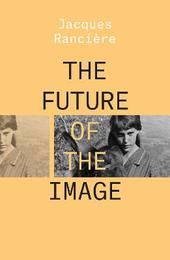
|
The Future of the Image
Paperback / softback
Main Details
Description
In The Future of the Image, Jacques Ranciere develops a fascinating new concept of the image in contemporary art, showing how art and politics have always been intrinsically intertwined. He argues that there is a stark political choice in art: it can either reinforce a radical democracy or create a new reactionary mysticism. For Ranciere there is never a pure art: the aesthetic revolution must always embrace egalitarian ideals.
Author Biography
Jacques Ranciere is Emeritus Professor of Philosophy at the University of Paris-VIII. His books include The Politics of Aesthetics, On the Shores of Politics, Short Voyages to the Land of the People, The Nights of Labor, Staging the People, and The Emancipated Spectator.
ReviewsLike all of Jacques Ranciere's texts, The Future of the Image is vertiginously precise. * Les Cahiers du Cinema * Ranciere's writings offer one of the few conceptualizations of how we are to continue to resist. -- Slavoj Zizek What we see here is Ranciere developing a unique voice as a political theorist. * Bookforum * French philosopher Jacques Ranciere is a refreshing read for anyone concerned with what art has to do with politics and society. * Art Review * It's clear that Jacques Ranciere is relighting the flame that was extinguished for many--that is why he serves as such a signal reference today. -- Thomas Hirschhorn A series of gratifyingly knotty and close discussions of nineteenth and twentieth century literature, film and painting. * Guardian * "Much of the value of Ranciere's writings on art and aesthetics arises from his initial refusal of terms that are self-evident to the point of invisibility. " -- Frieze "It is too simplistic to say that Jacques Ranciere is the anti-Bourdieu. But it is not inaccurate. Robustly conceptual where Bourdieu is empirical, abstractly philosophical where Bourdieu was sociologically precise, he offers a recasting of aesthetic questions that attempts implicitly to rescue the category of the aesthetic from the learned helplessness, or cynical reason, in which Bourdieu left it." -- Nicholas Dames * n+1 *
|